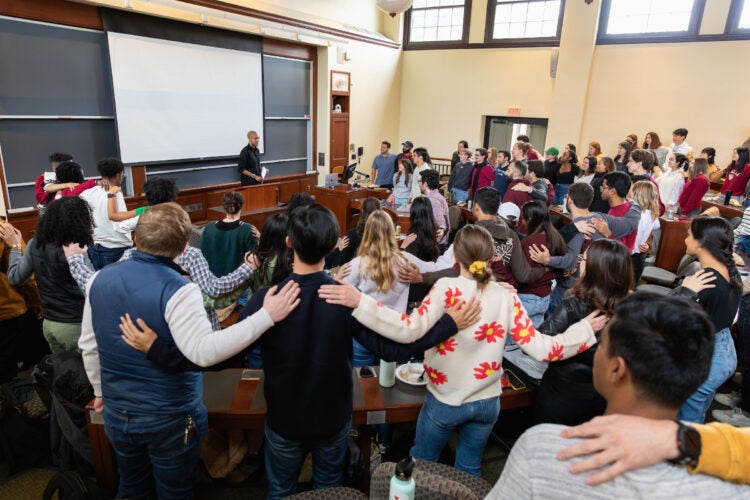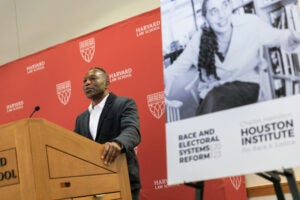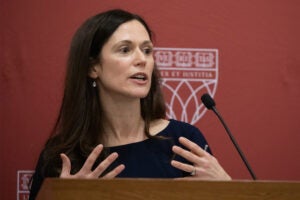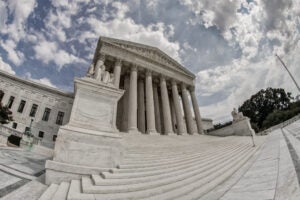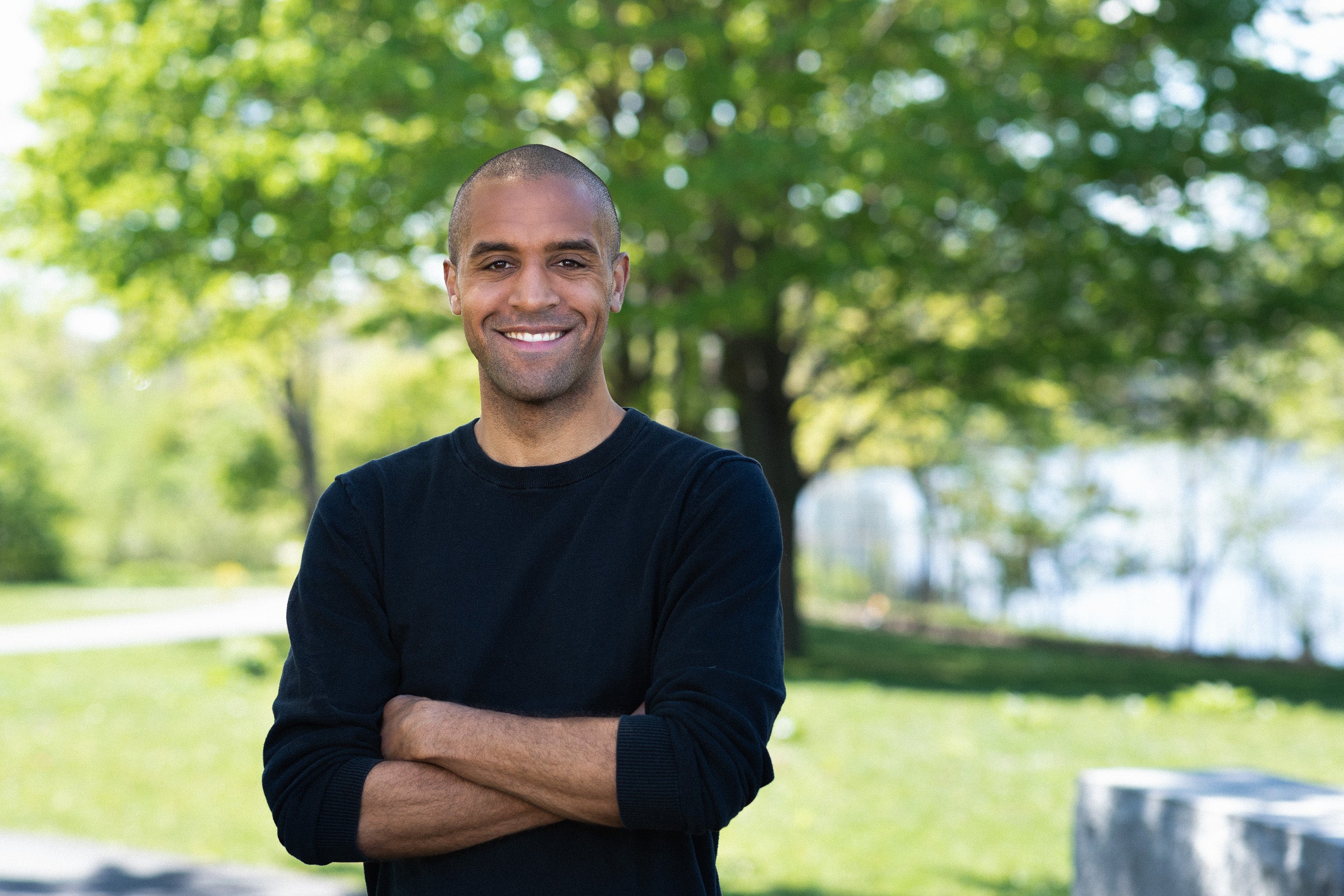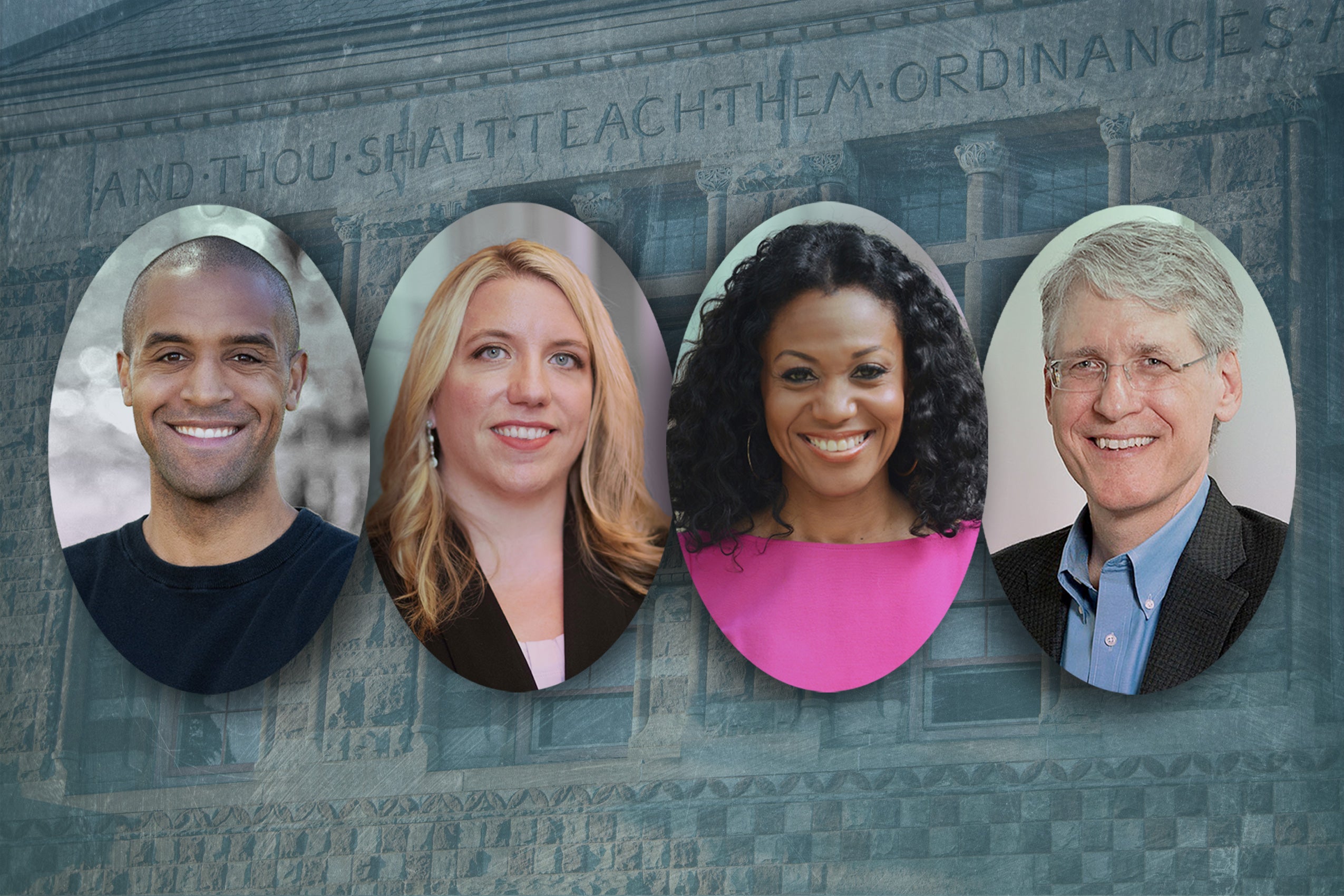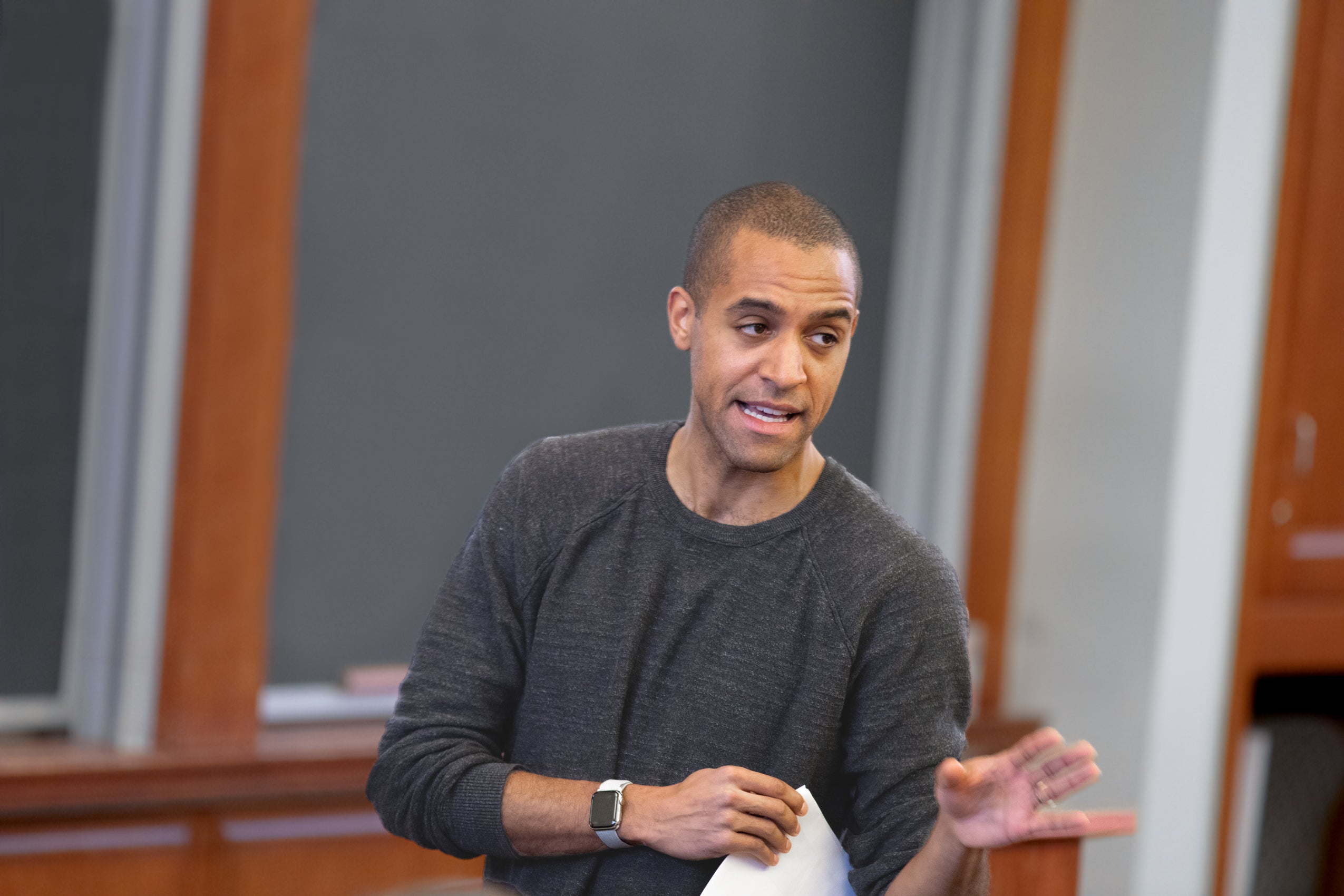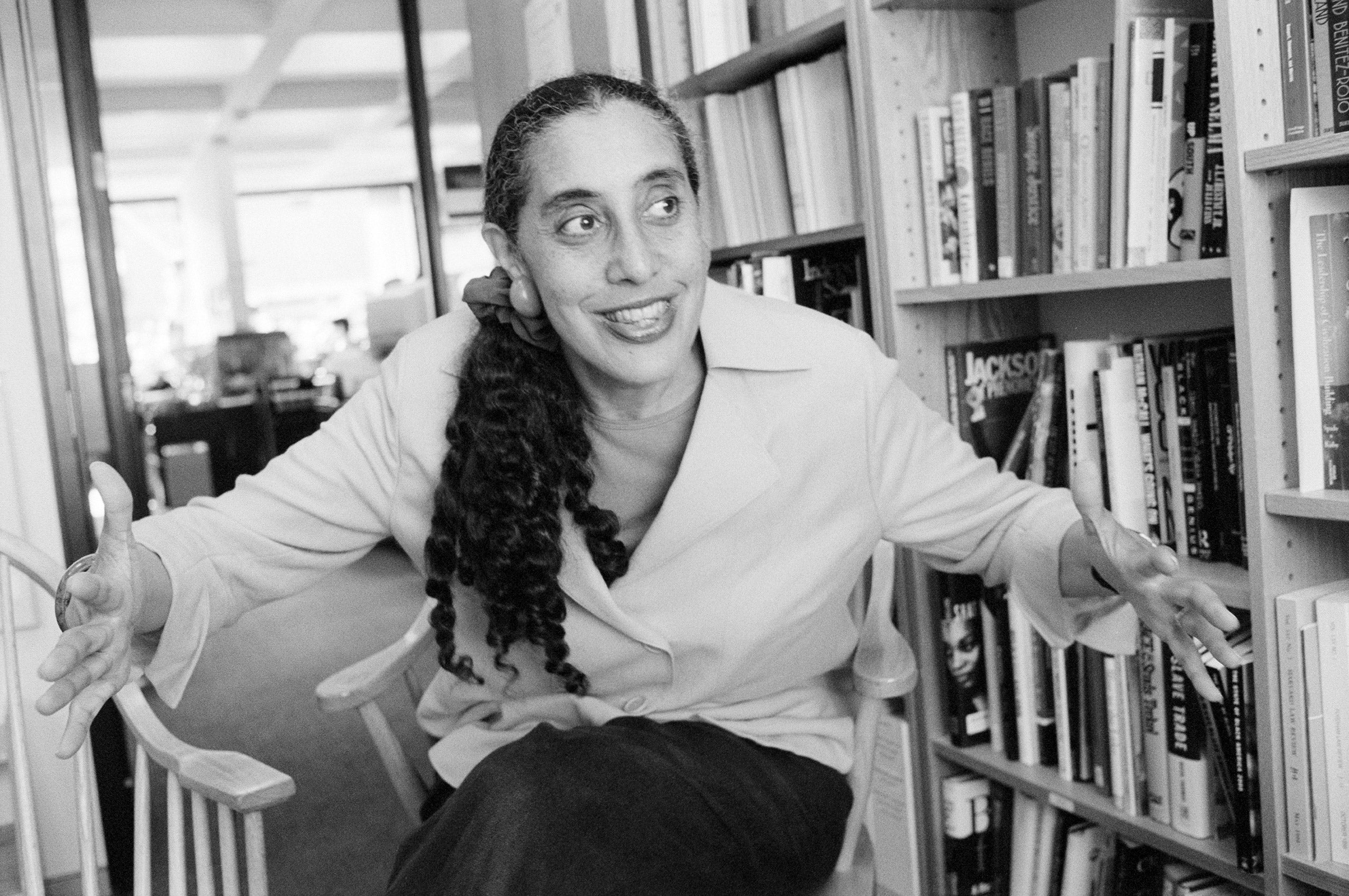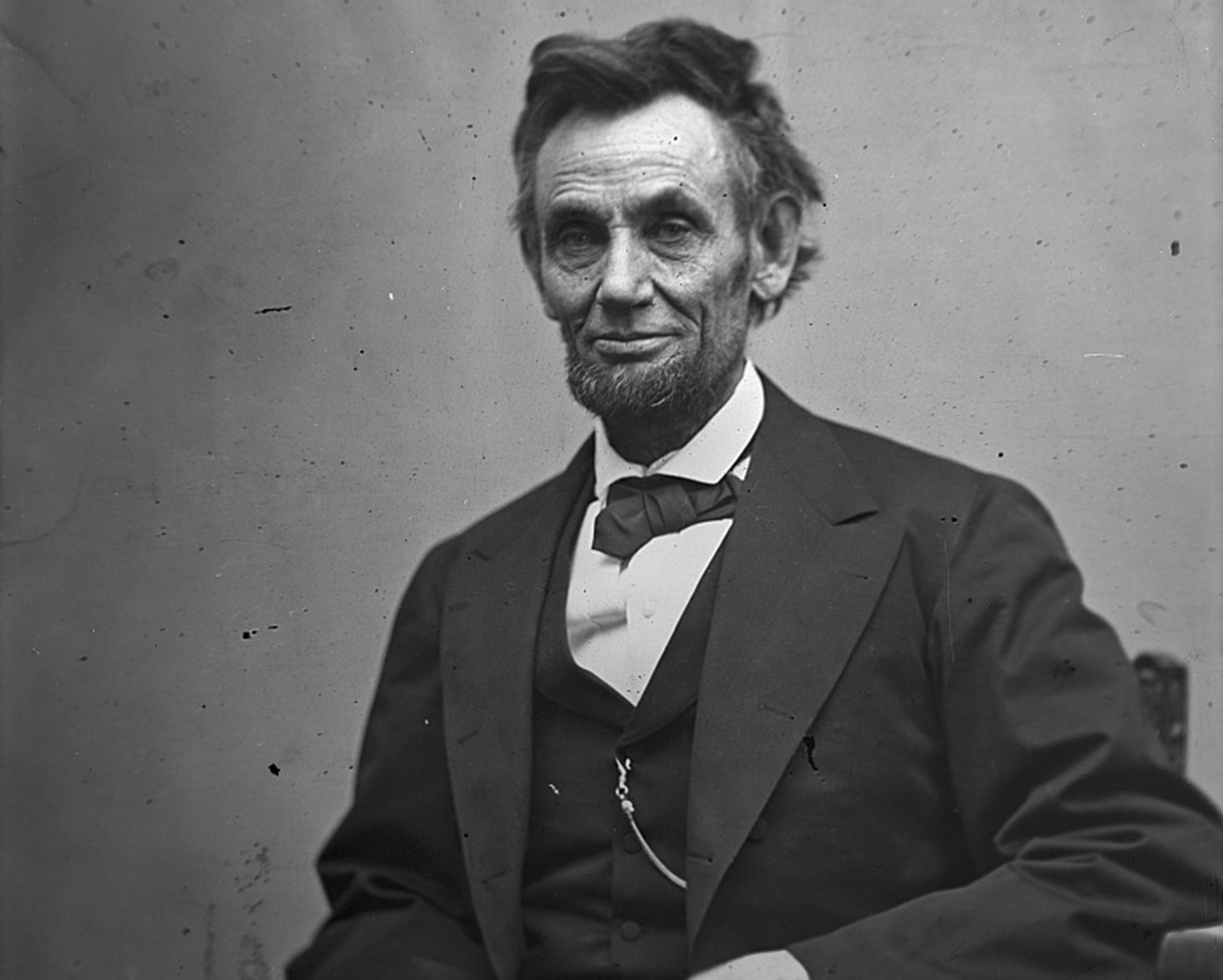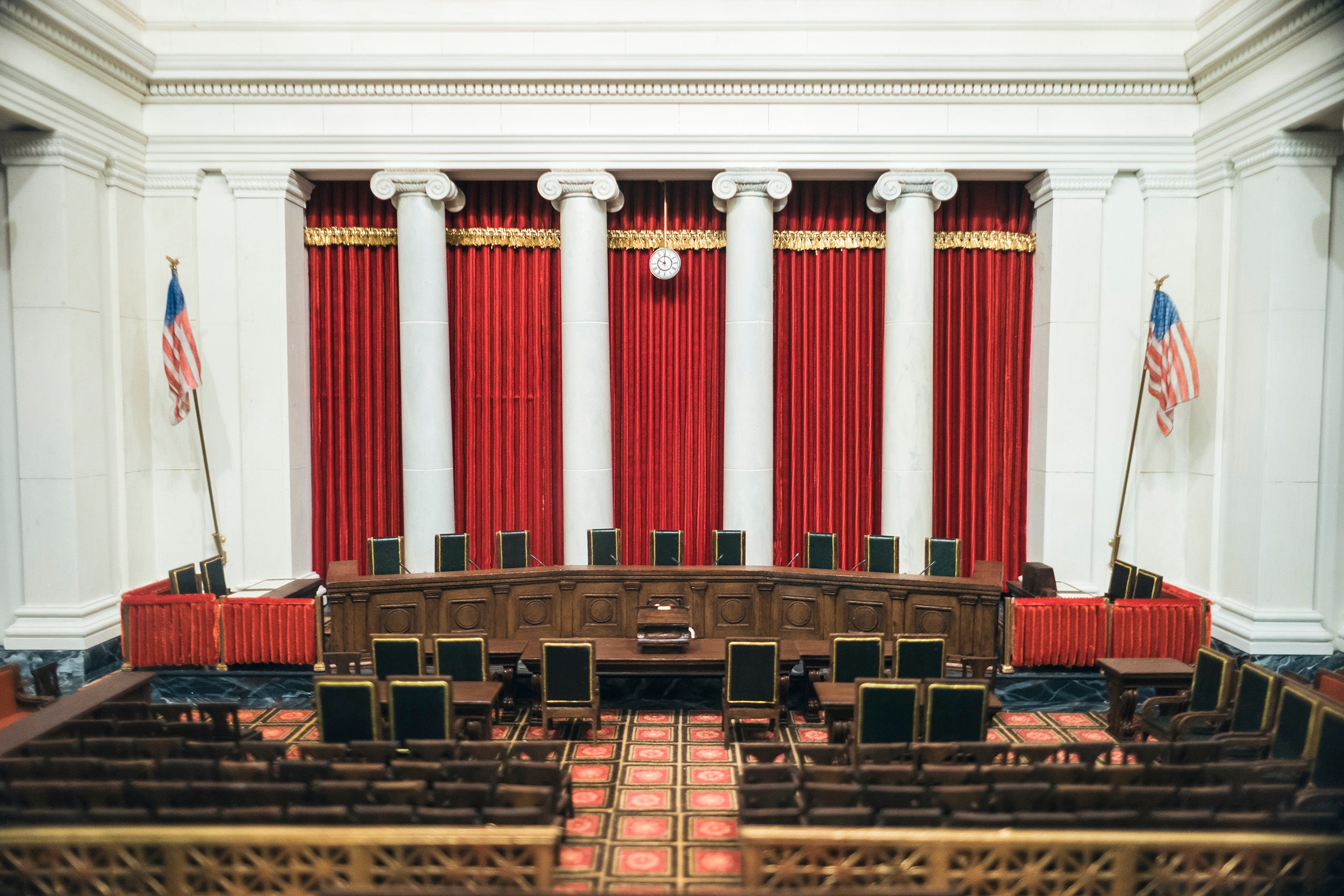People
Nikolas Bowie
-
A two-day conference, hosted by the Charles Hamilton Houston Institute for Race and Social Justice, examined election law and electoral systems impact communities of color
-
Delegitimize the Supreme Court
August 22, 2023
The Supreme Court’s approval rating is at record lows. A Gallup poll this summer showed that only 40 percent of Americans approve of the job…
-
Daphna Renan says we should ‘give the Supreme Court a little less control’ over the Constitution
February 10, 2023
On the occasion of her appointment as the Peter B. Monroe and Mary J. Monroe Professor of Law, Daphna Renan puts forth an argument for 'a more political constitutionalism.'
-
Harvard Law School experts weigh in on the Supreme Court’s final decisions.
-
Nikolas Bowie ’14, a scholar of constitutional law, local government law, and legal history, was named a professor of law at Harvard Law School.
-
Words from the wise
May 3, 2022
The Last Lecture Series, sponsored annually by the 3L and LL.M. class marshals, is a Harvard Law School tradition in which selected faculty members impart…
-
A draft Supreme Court opinion obtained by Politico and published online Monday night indicates the justices are on the verge of overturning Roe v. Wade, the landmark 1973 decision that made abortion legal nationwide, but a Harvard constitutional law scholar said opinions can change, and this document does not necessarily represent the court’s final ruling. “A draft opinion is only that: It’s a draft,” Nikolas Bowie, an assistant professor at Harvard Law School who teaches courses on constitutional law, told the Globe in a phone interview late Monday night. “Odds are this is not the latest opinion.” “Justices are all free to change their mind at any point before the final opinion is actually issued,” he added.
-
‘Change the world around you’
April 29, 2022
In a philosophical and wide-ranging Last Lecture, Harvard Law School Assistant Professor Nikolas Bowie ’14 reminded the Class of 2022 that they are on the verge of changing the world.
-
Fox News host Sean Hannity misleadingly claimed that President Joe Biden was venturing into unprecedented territory with his pledge to nominate a Black woman as a replacement for U.S. Supreme Court Justice Stephen Breyer, who is retiring after 28 years. ... Nikolas Bowie, assistant professor of law at Harvard Law School, said Hannity’s claim “ignores the reality that from 1789 through 1967, every president made race and gender a defining factor in their selection process by refusing to nominate anyone other than a white man.” ... Tomiko Brown-Nagin, another professor of constitutional law and history at Harvard University, said the late Justice Antonin Scalia’s Italian background was a “defining, positive factor in Ronald Reagan’s selection of him,” citing a report in Slate, a progressive online magazine.
-
In Memoriam: Lani Guinier 1950 – 2022
January 7, 2022
Lani Guinier, the first African-American woman to be tenured at Harvard Law School and an influential scholar who devoted her life to justice, equality, empowerment, and democracy, died Jan. 7.
-
Court Reform Is Dead! Long Live Court Reform!
December 13, 2021
Joe Biden’s Commission on the Supreme Court voted on the final version of its report last week. ... Almost no one thinks that the Constitution forbids adding justices, but the draft sounded notes of grave caution all the same. “The risks of court expansion are considerable,” it emphasized. One of the commissioners, the Harvard professor Andrew Crespo, worried that arguments in favor of expanding the Court had been “teed up to be knocked down.” In effect, he remarked, the report sent “a message that the underlying problem … is neither urgent nor serious, if it even exists.” Joined by another commissioner, the NAACP lawyer Sherrilyn Ifill, Crespo’s minor rebellion was the only part of the October meeting to draw serious coverage—forcing the commission back to the drawing board. This was not the first time the commission had accidentally generated the reform energy it was supposed to contain. Back in June, the group convened publicly to discuss for the first time the merits of various reform proposals. And although the interminable meeting seemed intended to sap the will of reform advocates, the testimony that received the most attention by far was that of the Harvard professor Nikolas Bowie, which went viral on Twitter and was given pride of place in both national reporting and op-eds calling for a more democratic law. Building on earlier calls to “disempower” the Supreme Court, Bowie’s testimony helped many progressives see that the threat posed by that institution goes beyond the reactionary attitudes of individual justices, and includes the undemocratic power the justices wield, regardless of ideological leaning.
-
On the bookshelf
November 30, 2021
Here are some of the latest from HLS authors to add to your reading list over the holiday break.
-
In a conflict between justice and the Constitution, ‘why should the Constitution prevail’?
November 16, 2021
Can, or even should, Americans break the U.S. Constitution when, in their view, justice demands it? As Noah Feldman and Nikolas Bowie discussed at a recent Harvard Law School Library Book Talk, that question is very much alive today.
-
Protecting the media to protect democracy
November 16, 2021
At a Harvard Law School Library Book Talk, Martha Minow, along with Vicki Jackson and Nikolas Bowie, discussed why the press is in danger — and how to save it.
-
The U.S. Supreme Court heard oral arguments on a sweeping new abortion law in Texas on Monday. The law, which went into effect in September, bans abortions after six weeks and relies on private-citizens-turned-bounty-hunters to enforce the law at $10,000 a head. The court’s decision not to block enforcement of the law before it went into effect places the legitimacy of the high court in question. ... However, this is not the first time, nor is it a rare moment when the judiciary stood against democracy and civil rights. ... “First, as a matter of historical practice, the court has wielded an antidemocratic influence on American law, one that has undermined federal attempts to eliminate hierarchies of race, wealth and status,” Nikolas Bowie, an assistant professor of law at Harvard Law School, testified to the Presidential Commission on the Supreme Court of the United States that was formed last spring. “Second, as a matter of political theory, the court’s exercise of judicial review undermines the value that distinguishes democracy as an ideal form of government: its pursuit of political equality.” Bowie noted that Alexis de Tocqueville identified jurists as the American aristocracy, a privileged class with lifetime tenure who, as “the priests of Egypt,” regarded themselves as “the sole interpreter of an occult science” of the Constitution. He also pointed out that the Supreme Court has consistently protected the wealthy, invalidated federal laws enacted to increase political equality and has shown deference to Congress when it passed laws that harmed “racial, religious or ideological minorities” such as Native Americans, Chinese immigrants, those who live in U.S. territories, Muslim refugees and others.
-
Has Texas Spelled the End of Abortion Rights in America?
September 3, 2021
The Supreme Court late Wednesday night took a break from its summer recess to allow the most restrictive abortion law in the nation to take effect in Texas, raising alarm among people who support abortion rights — and even some who don’t. ... Supporters of abortion rights have noted that it is still within the Democratic Party’s power to enshrine abortion rights in law: After all, Democrats still control two branches of government, Nikolas Bowie, a Harvard law professor, points out: Last year, candidate Biden promised that he would pass legislation to make Roe “the law of the land.” Now’s his chance. Congress has many, many options for overruling Texas and protecting reproductive justice nationwide—starting with the Women’s Health Protection Act.
-
A Texas law that bans abortion after six weeks of pregnancy went into effect on Wednesday after the United States Supreme Court chose not to enjoin it from being enforced. ... In the absence of Supreme Court intervention, many were urging the Biden administration to take immediate action to address the situation in Texas. “Last year, candidate Biden promised that he would pass legislation to make Roe ‘the law of the land.’ Now’s his chance,” said Niko Bowie, an assistant professor at Harvard Law School.
-
As part of ongoing analysis, the 36-member Presidential Commission on the Supreme Court of the United States, 16 of whom are Harvard Law School faculty or alumni, recently solicited testimony from scholars across the political spectrum to weigh in on Court reform.
